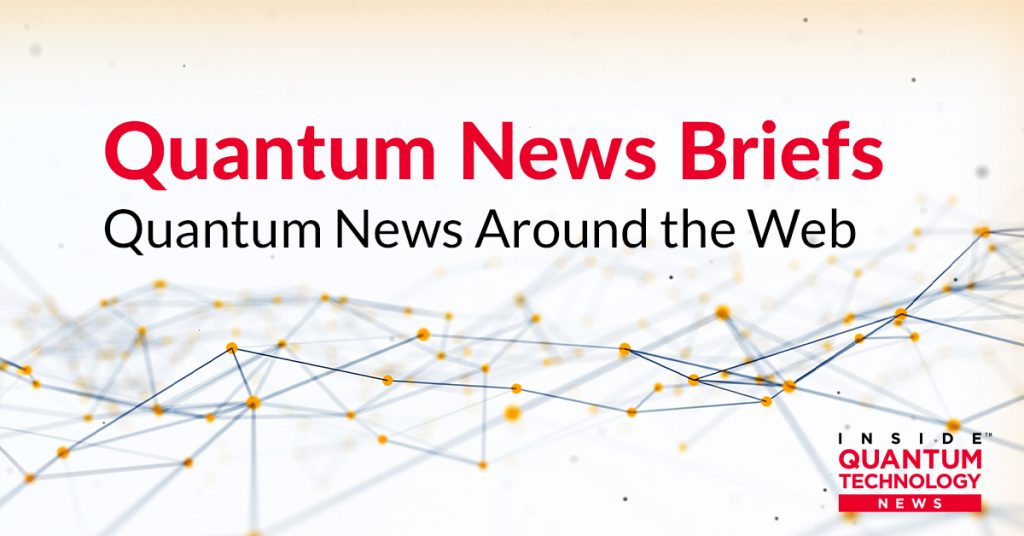Quantum News Briefs: December 7, 2023:
In cooperation with Munich Quantum Valley, the Leibniz Supercomputing Centre is procuring a quantum computer based on trapped-ion technology
The Leibniz Supercomputing Centre (LRZ) and Munich Quantum Valley (MQV) are enhancing their quantum computing capabilities with a new 20-qubit ion-trap quantum computer developed by Alpine Quantum Technologies (AQT). This system, funded by Bavarian State Ministries with approximately 9.8 million euros, will be accessible to MQV’s seven member organizations, primarily for system software research. Unlike superconducting qubits, the AQT ion-trap qubits are controlled by laser beams and can operate at room temperature, offering lower error rates and requiring less power. The computer, integrated into LRZ’s high-performance supercomputers, aims to accelerate supercomputing and develop efficient workflows. This addition enriches the Munich Quantum Software Stack, making the programming environment more versatile and supporting diverse technological integration, thus advancing the field of quantum computing and its practical applications.
Airbus and BMW Group launch Quantum Computing Competition to tackle their most pressing mobility challenges
Airbus and BMW Group have jointly launched “The Quantum Mobility Quest,” a global Quantum Computing Challenge aimed at addressing critical challenges in the aviation and automotive industries that have been unresolvable by classical computers. This pioneering challenge seeks to exploit quantum technology for practical industrial applications, focusing on enhancing transportation efficiency, sustainability, and safety. The initiative invites students, PhDs, academics, researchers, startups, and professionals worldwide to contribute innovative quantum computing solutions. Participants can tackle problems like improving aerodynamics design, advancing future automated mobility, optimizing sustainable supply chains, enhancing corrosion inhibition, or proposing new applications in transportation. Supported by Amazon Web Services, the challenge comprises two phases: developing theoretical frameworks and implementing solutions. A jury of leading quantum experts, alongside Airbus, BMW Group, and AWS representatives, will award a €30,000 prize to the winning team in each of the five challenge areas by the end of 2024, fostering significant advancements in quantum computing’s role in future mobility.
HSBC tests protecting FX trading from quantum computer attacks
HSBC has successfully conducted the world’s first trial of a new tool to safeguard highly sensitive financial data from potential cyber threats from advanced quantum computers. The trial, a significant milestone in cybersecurity, involved securing a 30 million euro to U.S. dollar trade on HSBC’s AI Markets platform. This initiative highlights the growing concerns in the banking industry about the capability of quantum computing to breach traditional encryption methods, particularly in high-stakes areas like the $7.5 trillion daily foreign exchange market. The test, which utilized a network set up by British telecom company BT and devices from Toshiba, also had support from Amazon Web Services. HSBC’s experiment with quantum key distribution (QKD) – a method using light particles for transmitting secret keys for data encryption – is seen as a crucial step in preparing digital infrastructures for future quantum-based security threats, ensuring the continued protection of sensitive financial transactions.
In Other News: Brookings Institution article: “U.S. quantum leadership may hinge on public perceptions”
A commentary article from the Brookings Institute highlights Quantum Information Science and Technology (QIST), particularly quantum computing, is emerging as a transformative force in science, economy, and defense sectors in the U.S., yet remains less understood and popular than AI. This gap may affect the U.S.’s capability in QIST human capital, research, and economic potential. The U.S. House Committee on Science, Space, and Technology is addressing this by reauthorizing the National Quantum Initiative (NQI) Act, emphasizing the importance of QIST for the country’s future competitiveness and security. This Act aims to develop a skilled quantum workforce across various disciplines and increase public awareness and education in QIST. Unlike the current special-purpose role of quantum computing, future applications are expected to have a broader impact. However, challenges include quantum computers’ complexity and high costs, limited understanding of their practical use, and a need for more public education and workforce development in this field. The NQI Reauthorization Act is a significant step to enhance QIST exposure, participation of underrepresented groups, and student workforce programs, which is crucial for maintaining U.S. competitiveness in the rapidly evolving quantum sector.
In Other News: Quanta Magazine article: “The (Often) Overlooked Experiment That Revealed the Quantum World”
A recent article in Quanta Magazine focuses on Otto Stern and Walther Gerlach’s groundbreaking 1992 experiment unveiled fundamental aspects of quantum mechanics, challenging the conventional physics of the time. Their experiment initially intended to disprove Niels Bohr’s atomic theory. It paradoxically confirmed it by demonstrating that silver atoms in a magnetic field could only follow two distinct paths, indicating quantum behavior. This finding initially misinterpreted due to the then-unknown properties of electron spin and magnetic moment, became a cornerstone of quantum mechanics. Recently, physicists in Israel have recreated the Stern-Gerlach experiment with advanced sensitivity, using supercooled rubidium atoms to complete the experimental loop predicted in 1927. This achievement not only confirms the quantum nature of the original experiment but also opens new avenues for probing the limits of quantum mechanics, especially in understanding quantum gravity. The team’s current efforts involve adapting the experiment to study macroscopic objects like diamonds, potentially bridging quantum mechanics with gravity and exploring the quantum-classical boundary.
Kenna Hughes-Castleberry is the Managing Editor at Inside Quantum Technology and the Science Communicator at JILA (a partnership between the University of Colorado Boulder and NIST). Her writing beats include deep tech, quantum computing, and AI. Her work has been featured in Scientific American, Discover Magazine, New Scientist, Ars Technica, and more.
